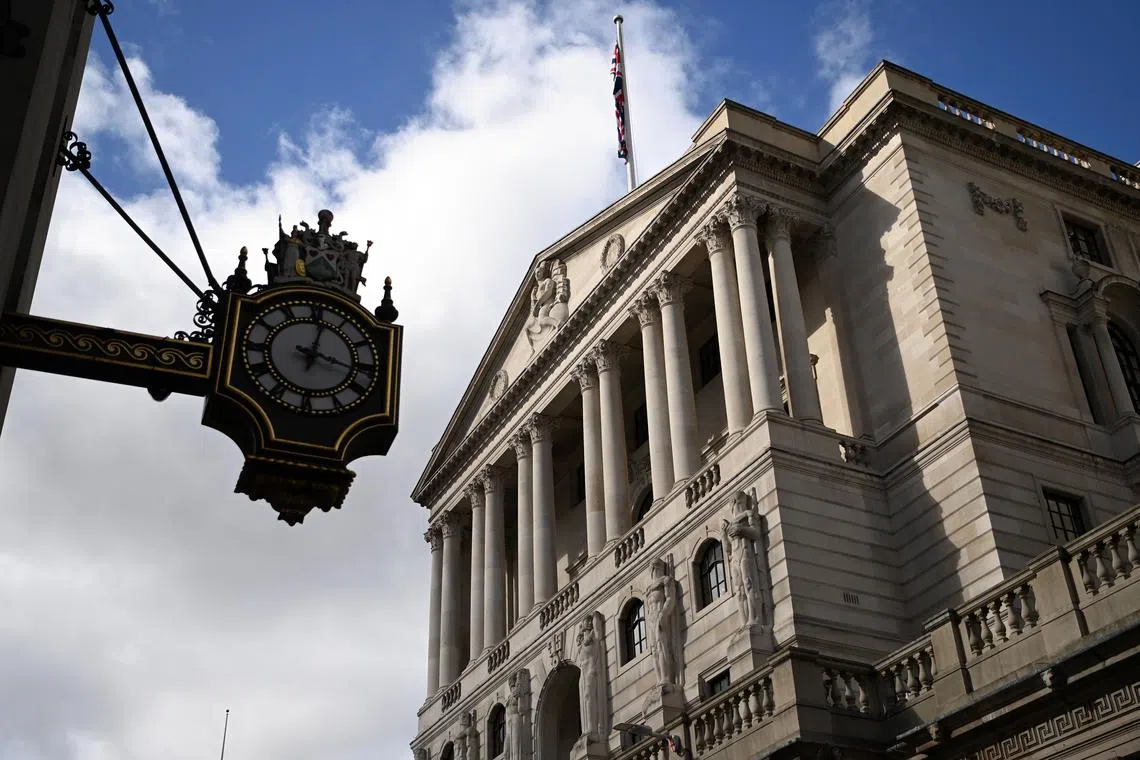Credit Suisse shares jump 20% after bank secures $73 billion lifeline
Sign up now: Get ST's newsletters delivered to your inbox

Credit Suisse is the first major global bank to be given an emergency lifeline since the 2008 financial crisis.
PHOTO: EPA-EFE
Follow topic:
ZURICH/LONDON - Credit Suisse shares jumped over 20 per cent on Thursday after Switzerland’s central bank stepped in to support the lender, triggering a rally in bank stocks across Europe on easing investor concern about a looming global banking crisis.
The move helped stem heavy selling in financial markets in Asia and sent European bank stocks rallying.
Credit Suisse shares surged by as much as 32 per cent in the first few minutes of trade on news of the lifeline, and were last up 24 per cent in heavy volume, reversing some of the losses that stripped off a quarter of its market value the day before. According to Refinitiv data, Credit Suisse shares were changing hands at a rate of 33.27 million per hour, the fastest on record.
The Euro Stoxx Banks Index climbed 2.1 per cent at 8.53am in Paris after tumbling 8.4 per cent on Wednesday, the most since March 2020. The broader Stoxx 600 Banks Index gained 1.9 per cent.
Credit-default swaps showed easing tension in debt markets. Credit Suisse’s senior unsecured euro-denominated bonds due March 2029 recovered almost half of Wednesday’s losses, according to data compiled by Bloomberg.
Credit Suisse tapped the Swiss National Bank (SNB) for as much as 50 billion francs (S$73 billion) and offered to repurchase debt. The chairman of the firm’s biggest shareholder said in an interview with CNBC that the lender is not likely to seek more capital, and the bank is generally “sound”.
“The initial fallout has been contained by the SNB’s backstop overnight, but I think the cat’s out of the bag in terms of the lagged damage that aggressive policy tightening can do to both the real economy and financial markets,” said Mr Viraj Patel, a global macro strategist at Vanda Research in London.
“There will remain a bit of nervousness in markets as investors wait to see what happens next,” he added.
Fears of a contagion are overblown, said Mr Mathieu Racheter, head of equity strategy at Bank Julius Baer, though the market will remain nervous as it searches for “other weak links”.
JPMorgan analysts said the loan from the SNB would not be enough to soothe investor concerns, and that “status quo was no longer an option”, leaving a takeover of Credit Suisse as the most likely outcome.
Credit Suisse is the first major global bank to be given an emergency lifeline since the 2008 financial crisis, and its problems have raised serious doubts over whether central banks will be able to sustain their fight against inflation with aggressive interest rate hikes.
The stock plunged as much as 30 per cent on Wednesday after Credit Suisse’s largest backer, Saudi National Bank, said it could not offer any more financial assistance for regulatory reasons.
Throughout most of the Asian day, stocks wallowed in the red as investors rushed to the relative safe havens of gold, bonds and the dollar. While Credit Suisse’s announcement helped trim some losses, trade was volatile and sentiment fragile.
The head of Japan’s banking lobby said that there were no signs at the moment of the Japanese financial system being affected by a crisis of confidence in Credit Suisse, as Japanese banks are well-capitalised.
Credit Suisse chief executive Ulrich Koerner told his staff in a memo that they should focus on facts as he pledged to rapidly move forward with a plan to streamline operations.
Meanwhile, Credit Suisse bankers in Asia contacted clients to reassure them after the latest inflow of funds.
A Hong Kong-based senior banker said: “We have been telling them to read the statements and look at the fact that we are buying three billion francs worth of bonds because they are so cheap.”
Investor focus is also on any action by central banks and other regulators elsewhere to restore confidence.
Policymakers in Australia and South Korea sought to reassure markets that banks in their jurisdictions were well-capitalised.
‘Flight to safety’
Rapid rises in interest rates have made it harder for some businesses to pay back or service loans, increasing the chances of losses for lenders, who are also worried about a recession.
Traders are now betting that the United States Federal Reserve, which just last week was expected to accelerate its interest rate hike campaign in the face of persistent inflation, may be forced to hit pause and even reverse course.
Unease sparked by Silicon Valley Bank’s demise has also prompted depositors to seek out new homes for their cash.
Mr Ralph Hammers, chief executive of Credit Suisse’s rival UBS, said market turmoil has steered more money its way. Deutsche Bank CEO Christian Sewing also said that the German lender has seen incoming deposits. REUTERS, BLOOMBERG

